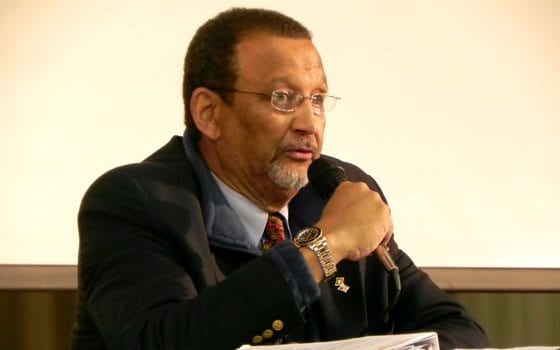

Author: Richard CaesarMaj. Joseph Bernadel of the Interim Haiti Recovery Commission answers a question at Friday’s town hall meeting.
The local Haitian community got their chance to grill key players in the Haiti earthquake recovery effort at a recent town hall meeting held last Friday, March 4.
Almost a year and two months after a massive earthquake devastated Haiti, concerned members of the Boston Haitian community gathered at Jeremiah E. Burke High School in Dorchester to get answers. Providing those answers were; Tom C. Adams, the Special Coordinator for Haiti in the U.S. State Department, Paul Weisenfeld, Senior Deputy Assistant Administrator for USAID’s Bureau for Latin America and the Caribbean and Maj. Joseph Bernadel a member of the Interim Haiti Recovery Commission.
Marie St. Fleur, head of the city’s Office of Intergovernmental Relations, was instrumental in coordinating the event.
“We all remain very concerned about the state of affairs in Haiti right now.” St. Fleur said. “If you go to any Haitian community meetings or listen to Haitian radio, they express concern that they are over 1.3 million people who are homeless and that they haven’t seen real evidence of the rebuilding and they want to know what’s going on.”
That concern showed on the faces of Haitian Americans from all walks of life, who gathered in the school auditorium and listened to the panel talk about the difficulties facing the rebuilding effort.
“It is the largest disaster the western hemisphere has ever seen and brought the largest urban displacement we’ve ever dealt with as a humanitarian community anywhere in the world,” said Weisenfeld in his presentation. “We’ve never confronted a million and a half displaced people, so it has really stretched the humanitarian community to be able to respond.
“But there is a lot that has been done,” he went on. “… about 700, 000 people have been resettled in the last 13 months. In any other disaster, resettlement of 700, 000 people would be a significant accomplishment.”
Weisenfeld talked about the adverse affects of multiple disasters within the last year, on the humanitarian work in the country, “one of the tragedies of the last year is that there have been multiple tragedies over the last year. The cholera epidemic consumed most of the effort of the Haitian government and the international community.”
Adams focused on the State Department’s role in rebuilding the Haitian government, “The government capacity needs to be rebuilt,” he said. “Haiti also needs to have a government that has the confidence of the people.”
Adams also spoke about the State Department’s role in the recent electoral process in Haiti and expressed disappointment that the first round of voting had ended in controversy. He also took the opportunity to clarify that the U.S. was only interested in ensuring a fair democratic process, stating many times throughout the night, “the United States does not support any one candidate in this election.”
An hour-long question and answer session was filled with passionate calls, not just for answers but action on everything from homelessness in Port au Prince to transportation to public safety.
One such plea came from Virginia Benzan, who drew applause for her fervent appeal to Adams to support re-designation of temporary protected status for Haitians currently in America. “We’ve seen them do it with other countries. The conditions have worsened with the cholera outbreak and as a woman, I think it atrocious to send a woman back to someplace where we know she is going to be raped.” Benzan said, referencing gender-based violence in the temporary housing camps. “I’m just pleading with your office to do something.”
Many others just wanted to know what they could to contribute to the rebuilding effort. Adams told the Banner, “It’s clear that Haitian Americans are very passionate about rebuilding Haiti, they want to know what our government is doing and I think it is great thing.”
Maj. Bernadel was similarly optimistic as he spoke about the meeting and others, that he will be attending nationwide. “This forum is the best education platform we have so far…sometimes people won’t get all of their questions answered but it breaks that ice so people can start the process of investigating for themselves.”






